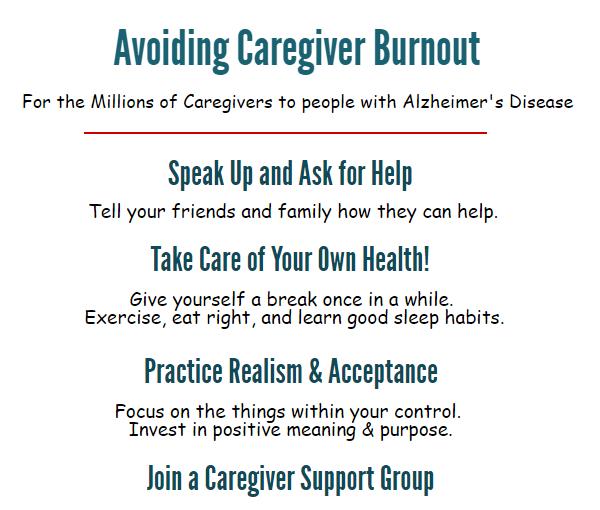The demands of caregiving for a loved one with Alzheimer’s disease can be overwhelming, especially if you feel you have little control over the situation or you’re in over your head. If this stress is left untreated, it can take a toll on your health, relationships, and state of mind—eventually leading to burnout.
Once you have recognized the symptoms of caregiver burnout and you realize that “going it alone” is no longer a healthy option for you or your loved one, it is time to seek help. There are many helpful resources and tools available.
Remember, you won’t be able to care for someone else if you don’t take care of yourself:
1. Don’t be afraid to speak up. Friends and family often want to help but do not necessarily know how you are feeling or what you need. Spread the responsibility as much as possible. Assign specific tasks to those willing to help. Accept help when offered and let others feel good about supporting you.
2. Give yourself a break. As a busy caregiver, leisure time may seem like an impossible luxury but it is important to allow yourself permission to rest and do things that you enjoy on a daily basis. Ask a friend or family member to take over for a bit so that you can get out of the house, socialize, take in a movie or participate in anything that boosts your spirits.
3. Practice acceptance of your situation. It is easy to feel burdened and trapped by your caregiving circumstance. Trying to make sense of your loved one’s illness and dwelling on the things you cannot change will not make you feel better. Focus on the things within your control, try to find the silver lining and avoid tunnel vision. Caregiving does not need to be your entire life. Invest in other things that give you meaning and purpose.
4. Take care of your health. Stay on top of your own doctor’s appointments in addition to those of your loved one. Be sure to exercise, meditate and eat well. Exercise and meditation are very powerful stress relievers. Nourishing your body with healthy food gives you energy and focus. Be sure to get enough sleep so that your mood, productivity and ability to handle stress do not suffer.
5. Lastly, join a support group. A caregiver support group connects people facing similar challenges and reduces your sense of isolation. Such groups are an effective way to form new friendships, share your feelings and learn tips for improving your situation. If you are unable to leave the house, many internet options are available.
Worried about the memory health of a loved one? Use the free Alzheimer’s-Dementia Memory Loss symptom checklist: mybraintest.org/alzheimers-...
